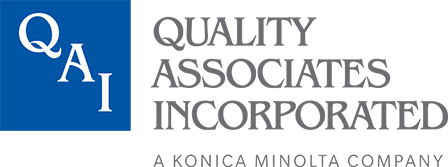In Chinese philosophy, the yin and yang represent contrasting forces that are interdependent and complementary to one another. The relationship between QAI and DocPoint Solutions is similar— while separate entities, the two are interconnected.
When we established DocPoint in 2008, we did so in response to the growing number of organizations struggling with inputting, storing, sharing and managing information across the enterprise. By leveraging QAI’s existing knowledge of document management and understanding of the needs of government and commercial clients, DocPoint would be able to provide a full range of consultative IIM solutions, services and support. Now, five years later, the relationship between the two has proven to be increasingly symbiotic in nature. While QAI focuses on the initiatives of data capture, DocPoint specializes in managing the captured content. For example, when QAI migrates or digitizes information, we classify the data in a certain way. These classifications then become the search criteria that get picked up by DocPoint’s solutions during search and retrieval.
Although the synergy between QAI and DocPoint has contributed to each company’s individual growth, it is our customers that receive the greatest benefits from this affiliation. Our customers have the convenience of looking no further than QAI and DocPoint—a “one stop shop”—for all their document management needs. It is sometimes the case that a single solution from either QAI or DocPoint cannot solve all of their specific business issues. Rather, a unique blend of services and expertise from both companies helps ensure that we are meeting our customers’ needs to the best of our ability. Today, more than half of our customers rely on both QAI and DocPoint, demonstrating the value of this relationship and its continued growth.
The Paper-Free Office
Creating a “paper-free” office environment is becoming more and more feasible and promises a cost-effective, viable method of document management. Yet, a recent AIIM survey reported that only 24% of respondents had a specific policy in place to drive paper out of their business. Given the potential benefits and cost savings of going paperless, why is this number so low?
Many organizations still have numerous unanswered questions about making the move towards a paper-free workplace. When asked about their main concerns, participants cited costs, legal admissibility, inflexible workflows, data-capture accuracy, and mobility—to name a few. QAI has the answers to these issues. Together with our subsidiary DocPoint Solutions, we can effectively design, implement and support comprehensive document management solutions to help organizations confidently take steps toward a paper-free work environment and streamline this seemingly daunting process. QAI provides and supports the software and hardware solutions for scanning and storing paper documents, whereas DocPoint offers Microsoft SharePoint services to enable collaboration and easy search and retrieval of these documents. In addition, the help of our partner network allows us to provide an even broader range of tools and resources that complement our existing expertise.
While QAI understands that many organizations are still reluctant to embrace a paper-free workplace, we are here to make the transition easier and demonstrate the potential benefits of an all-digital environment—improved compliance, better workflow management, greater accuracy, faster customer response, and more.
Governance And Compliance
As more information is stored electronically and “big data” becomes more prevalent, the need for establishing an information governance policy across the enterprise increases. However, having a policy in place is not enough in today’s marketplace.
A 2013 report from AIIM disclosed that 44% of survey participants claimed to have some level of enterprise-wide policy in place, yet half of those admit that their policy is for the most part unreferenced and unaudited. Moreover, the percentage of participants who train recruits and existing staff on current policies is alarmingly low—31% do not practice any governance training. AIIM observes, “We have identified a huge gap between having an approved policy on the shelf and having trained and informed staff who work to the policies every day.”
QAI and DocPoint Solutions recognize the importance of not only establishing an enterprise-wide information governance plan, but also continuously upholding it, reviewing existing policies, and remaining agile enough to evolve to meet the needs of a changing business environment. Once a flexible plan that is aligned with one’s business goals is in place, an organization can more readily realize reductions in storage costs, easier knowledge-sharing and better customer service.

